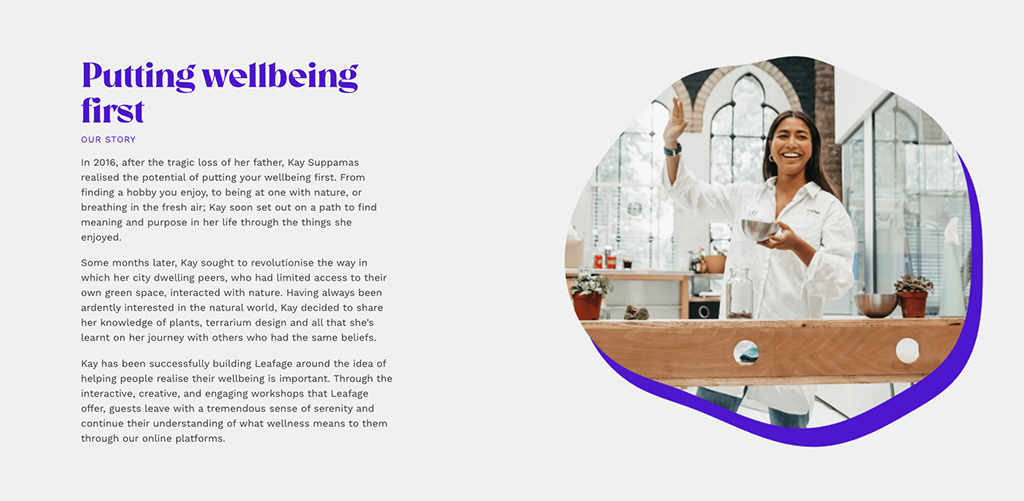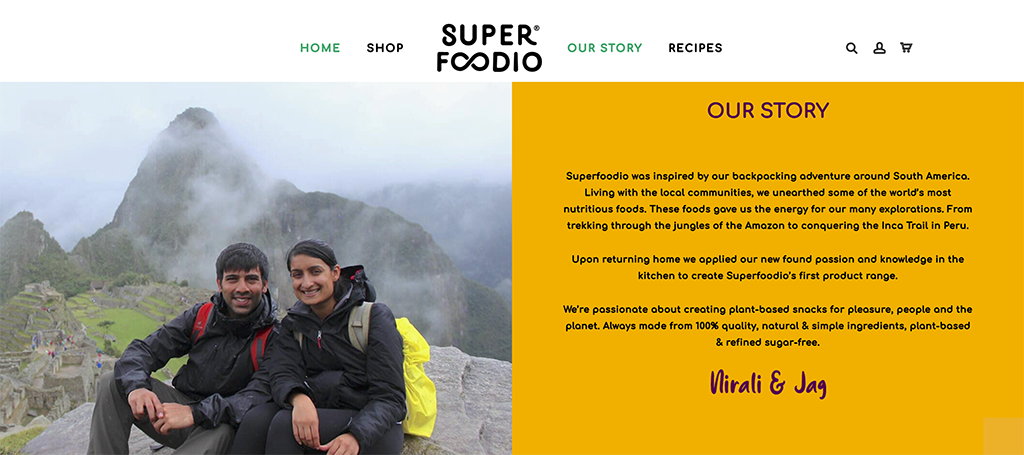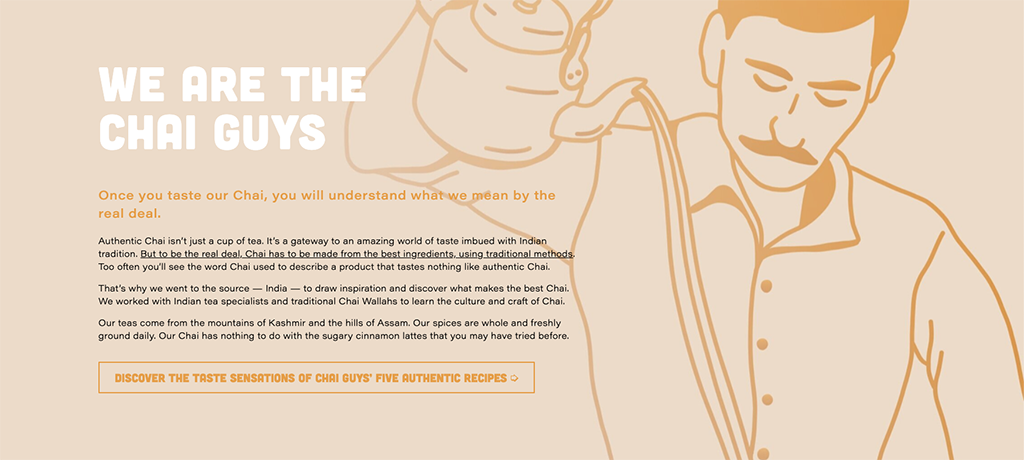The power of brand storytelling: How to tell your brand story
)
Posted: Fri 4th Oct 2024
As a small business, creating a meaningful connection with your customers is vital. Yet you may find that you're focusing too heavily on the logistics of your business and less on the story you're telling.
This can be a missed opportunity, as a compelling story is a powerful tool to attract organic traffic, build trust and establish lasting relationships with customers.
But what exactly is a brand story and how can it help your business stand out? This blog will show you the steps to craft your own brand story and how it can transform your small business.
What is a brand story? And why does your small business need one?
A brand story is more than a tagline or a company description – it's the unique narrative that tells customers who you are, what you stand for and why your business exists.
Unlike a dry business bio, a brand story has a beginning, middle and end. It shares your journey, values and mission, and it invites customers to become a part of that story.
For a small business, a well-crafted brand story can set you apart from competitors, create emotional connections with customers and make your business memorable.
As sales expert Daniel Plowright says:
"The story is the only thing that's going to stand out. In most target markets, you're going to be competing against someone else. The businesses that are telling the best story will succeed."
The benefits of a strong brand story
A brand story can make your entire marketing strategy more effective. Here's why your small business should invest in creating a brand story:
1. Greater customer loyalty
A relatable, authentic story can resonate with customers on a personal level. When customers see their own values reflected in your brand, they feel connected.
That leads them to put their trust in you and give you their loyalty. They're more likely to return to, support and recommend your business.
2. Increased organic traffic
A powerful story can naturally attract organic traffic through word-of-mouth, shares on social media and positive reviews. When your story reaches people on an emotional level, they're more likely to share it – which is free exposure!
3. Better brand recognition
A brand story that stands out can make your business more memorable. As people encounter your business across various channels, your story will help them remember who you are and what you stand for. This can be a great advantage, especially when you're competing with larger brands.
4. More efficient marketing
Once you've defined your brand story, it acts as a foundation for all your marketing efforts. From social media posts to emails and product descriptions, your brand story creates a cohesive message that makes your marketing feel authentic and aligned.
VIDEO: Transforming your business marketing with the power of story
Paul Dunn explains how to create narratives that elevate your brand beyond the ordinary and move from 'standard' to 'standout':
Key elements of an effective brand story
Crafting a brand story involves more than simply stating your business's mission. Here are the core elements that make a brand story impactful and memorable:
Authenticity
Your story should be true to your business and its values.
If you're a small business in a specific town or region, share that.
If your business was born out of a personal need or a family tradition, that origin story is part of your authenticity.
Stay genuine, as customers can often tell when a story doesn't feel true.
Relatable challenges
Talking about real-life challenges or obstacles you've overcome helps humanise your business. Did you face any struggles while starting or growing your business? Sharing these hurdles makes you more relatable and shows customers the real effort behind your brand.
Solution and transformation
Highlight how your business offers a solution or brings about a positive change. This might mean providing quality products at an affordable price, supporting local communities or offering a unique service. Show customers how your business can make a difference in their lives.
Customers as your central focus
While your story is about your business, it should ultimately reflect what customers care about. Frame your story in a way that shows customers how your brand benefits them, solving a problem or meeting a need.
Enterprise Nation adviser Paul Durrant says:
"If you communicate how you solve clients' problems in a concise and memorable story people are more likely to remember it when they next have a problem or need."
Daniel Plowright elaborates:
"What circumstances is your potential customer in? Typically, they have some problem or opportunity. They've crystalised what that problem is and they're looking for a service provider. You need to share what you've put in place to address that."
How to craft your small business brand story: A step-by-step guide
Creating your brand story doesn't have to be complicated. Here's a simple, step-by-step guide to help you develop a narrative that resonates with your target audience.
1. Identify your brand's core values and mission
Start by defining your "why". What motivated you to start your business? What are the values that guide your work? This foundational step helps you uncover the themes that will shape your story.
Business consultant Karen Green explains:
"Your 'why' helps customers share the passion you, as the business owner, are feeling. It allows them to engage better with your brand and give it credibility.
"People love passion and are prepared to pay more if it resonates with their own values."
2. Outline your story structure
Think of your story in three parts: beginning, middle and end.
The beginning is the inspiration or problem that started your journey.
The middle details your challenges and how you addressed them.
The end reveals how your business has grown or how it benefits your customers today.
Karen Green says:
"The successful stories, whether from movies or about products, follow a classic path. Lead your customers through the entrepreneur's journey and they'll feel like they're part of it and will want to get involved.
Here are the stages that make up Karen's favoured storytelling structure:
Old normal: Couldn't find a healthy, gluten-free snack
Clear goal: Wanted a product that tasted great
Obstacles: Developing the recipe was a nightmare
External allies: An amazing product developer helped me
Struggle: Convincing someone to make it for me
New normal: The product's launched
This approach helps buyers understand why customers love the brand – other people are experiencing the 'old normal'.
3. Incorporate real experiences
Personal stories are memorable and engaging. Share real-life moments, such as the excitement of your first sale, the challenges you faced or the people who inspired you. This makes your brand more relatable and authentic.
4. Focus on the customer's role in your story
Ultimately, your brand story should forge a strong connection with your audience's values, aspirations and human experience. Show customers how they fit into the story by making them the hero.
For example, if you run a coffee shop, emphasise how you provide a welcoming space for people to gather, relax or work.
Daniel Plowright says:
"The hero of the piece should always be your customer. Let's say you provided a service and asked for a testimonial. You should take that opportunity to sell what they do too."
5. Review and refine
Once you've crafted your story, make sure it lines up with your brand image and can be consistently applied across all your marketing channels. Review it for clarity and make adjustments as needed.
Paul Durrant says:
"Test your story on friends, families and business associates. That will help you modify the story so it's more engaging and memorable. Just remember that a good story normally needs refining to make it a great story."
Karen Green urges some caution, however:
"A very well-rehearsed story can seem staged and not give the real power that a story should. I think creating two or three headlines that lead the listener to the brand values is helpful. Then each time you tell the story, it comes from the heart but uses that logical sequence."
With these five steps, you’ll be able to craft a compelling brand story that highlights your values, connects with your audience and showcases the journey that brought your business to life.
VIDEO: How to communicate your brand's story effectively
Sophie Lee shares powerful storytelling frameworks that will captivate your audience, draw them audience in and keep them engaged from the start:
How to use your brand story across different marketing channels
Once you've developed your brand story, it's time to share it with the world. Here's how you can bring your story to life across various platforms:
Website and blog
You should feature your brand story prominently on your website, especially on the "About us" page. This page is often where customers go to learn more about your business. Integrate storytelling into blog posts as well, sharing behind-the-scenes insights, founder stories or customer testimonials.
Social media
Social media is a key part of successful brand storytelling. Share snippets of your story, like why you started, what motivates you or memorable experiences you've had with customers. Use visuals to reinforce your story, like photos of your team, workspace or products in action.
Email marketing
When new subscribers join your email list, introduce them to your brand story. Use follow-up emails to reinforce the story, sharing updates, customer stories or milestones that keep your brand's journey alive.
Product descriptions
Infuse story elements into your product descriptions. Instead of simply listing features, explain how the product reflects your brand values or meets customers' needs. For example, if you sell a handmade product, you could share a bit of the maker's story.
Customer engagement
Encourage customers to share their own experiences with your brand. Their testimonials or social media posts add to your brand's story, creating a community that extends beyond your business.
Brand storytelling examples from Enterprise Nation members
Leafage

Kay Suppamas certainly overcame adversity on her way to founding Leafage. The story of her business is beautifully told, and it's easy to see how the language Kay uses informs the wider brand.
It's also straightforward to spot the old normal (city dwellers having limited access to green space), the clear goal and obstacles (helping very busy city dwellers realise that wellbeing is important) and the new normal (running terrarium workshops that give a sense of serenity, and continuing to help people understand wellness).
Superfoodio

Superfoodio founders Nirali and Jag tell a story of adventure, good food and start-up success in three short paragraphs. The old normal here is that, surprise surprise, people enjoy snacking.
The clear goal and obstacles are that the same people, by and large, don't really think beyond their own pleasure when snacking. How to convince them that they should snack for "people and planet", too?
The new normal here lies in Superfoodio tapping into three consumer trends: convenience (letterbox-friendly home delivery), gifting (products can come in gift boxes or hampers) and natural, environmentally friendly ingredients (plant-based, no palm oil) – all of which serve as superb story fodder.
Chai Guys

Enterprise Nation was lucky enough to chat with Chai Guys Abhilash and Gabriel at length about the story behind their brand. They recognised the old normal of coffee being people's takeout drink of choice. Their clear goal and obstacles lay lied in persuading consumers to drink chai instead, which proved especially tricky owing to the ubiquity of chai latte.
Abhilash and Gabriel's struggle and new normal lay in telling the story of authentic chai, while tackling their conflict head on:
"Authentic chai isn't just a cup of tea. It's a gateway to an amazing world of taste imbued with Indian tradition. But to be the real deal, chai has to be made from the best ingredients, using traditional methods. Too often you'll see the word chai used to describe a product that tastes nothing like authentic chai."
How to measure your brand story's success
Once you've shared your story, it's important to assess how it's performing. Here's how you can do that:
Website analytics
Track metrics like time spent on the "About us" page, blog engagement and referral traffic from story-based pages. High engagement on these pages suggests that visitors are interested in your story.
Social media metrics
Look at engagement rates, shares and comments on posts that tell parts of your story. If people are engaging with your story-based content, it's a good sign that your story is resonating.
Customer feedback
Gather feedback through surveys, reviews or social media comments. Positive responses to your story indicate that it's making an impact.
Conversion rates
Measure conversion rates from pages or campaigns that emphasise storytelling. If visitors who engage with your story are more likely to make a purchase, your story is serving its purpose.
Key takeaways
In a crowded marketplace, a strong brand story can be your secret weapon. By sharing your unique journey, values and mission, you can build lasting relationships with customers and set your business apart.
As a small business, you have an incredible opportunity to use storytelling as a cost-effective marketing tactic that delivers powerful results.
Relevant resources
You might also like…
Get business support right to your inbox
Subscribe to our newsletter to receive business tips, learn about new funding programmes, join upcoming events, take e-learning courses, and more.
Start your business journey today
Take the first step to successfully starting and growing your business.
Join for free
